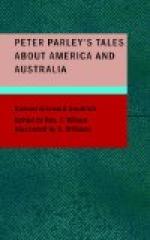Charleston is another of the principal sea-ports of the States. It is the largest town in South Carolina, and is situated at a low point of land at the confluence of two rivers. It is the stronghold of slavery. One of the most recent events connected with it is that of the Northerners blocking up the harbour by sinking several ships, laden with stones, at the entrance. This is a very barbarous act, as it closes—perhaps for ever—one of the first ports in America.
Philadelphia is the last city I shall mention. It is the great Quaker city; its streets are remarkable for their regularity, and the houses and stores for the peculiar air of cleanness which they exhibit. The public buildings are nearly all of white marble. It is distinguished for its vast number of charitable institutions and religious edifices, and it is a thriving place of business. The city was founded by William Penn in 1682. There is a monument marking the site of the signing of Penn’s famous treaty with the Indians. With some little account of this treaty I shall conclude my notice of America.
King Charles II. made a grant of land to Penn, but this good man would not enter upon its possession until after he had arranged a treaty with those to whom he justly thought it more fairly belonged than to the King of England—namely, with the Indians. He consequently convened a meeting—under the wide spreading branches of an elm tree, the Indian chiefs assembled. They were unarmed; the old men sat in a half-moon upon the ground, the middle aged in the same figure, at a little distance from them; the younger men formed a third semicircle in the rear. Before them stood William Penn,—a light blue sash, the only mark which distinguished him from his friends, bound round his waist.
“‘Thou’lt find,’
said the quaker, ’in me and mine,
But friends and brothers to thee and thine,
Who above no power, admit no line,
Twixt the red man and the
white.’
And bright was the spot where the quaker
came,
To leave his hat, his drab, and his name,
That will sweetly sound from the trumpet
of fame,
Till its final blast shall
die.”
It is to be regretted that the speeches of the Indians on this memorable day have not come down to us. It is only known that they solemnly pledged themselves to live with William Penn and his people in peace and amity so long as the sun and moon should endure. This was the only treaty, it has been said, between these people and the Christians that was not ratified by an oath, and that was never broken.
AUSTRALIA.
CHAPTER XVI.
Parley tells about new south Wales.
At the termination of the American war, of which I have just given you a short account, the United States of America, which had been called by England her American Colonies, ceased to be any longer subject to Great Britain.




